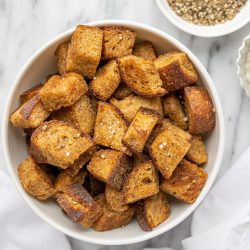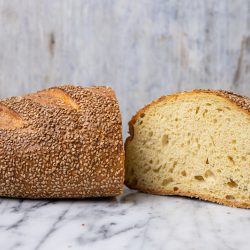When not sourcing ingredients, I’m hanging out with many of you fine readers in our Bakeshop. While working in the shop, I get a lot of questions about what ISN’T in our bread. Surprising to many, Zingerman’s Bakehouse bread is free from most things. Such a liberated baked good! For instance, this is a comprehensive list of ingredients in our sourdough bread, in order of amount:
• Organic wheat flour
• Water
• Whole wheat flour
• Sea salt
Farm bread? Organic wheat flour, water, whole wheat flour, sea salt. Rustic Italian? Organic wheat flour, water, sea salt, and yeast. Sensing a pattern? With ingredient lists this short, how do we make our breads so exceptionally good, you ask? So unique? So different from each other? Largely, our process. The secret to our bread is in the way Amanda mixes, the way Isaac feeds the starter, the way Makha shapes the dough, the way Ellie steams the bread in the ovens. Our breads are also set apart by our focus on the ingredients themselves. By volume, this primarily means focusing on quality flour.
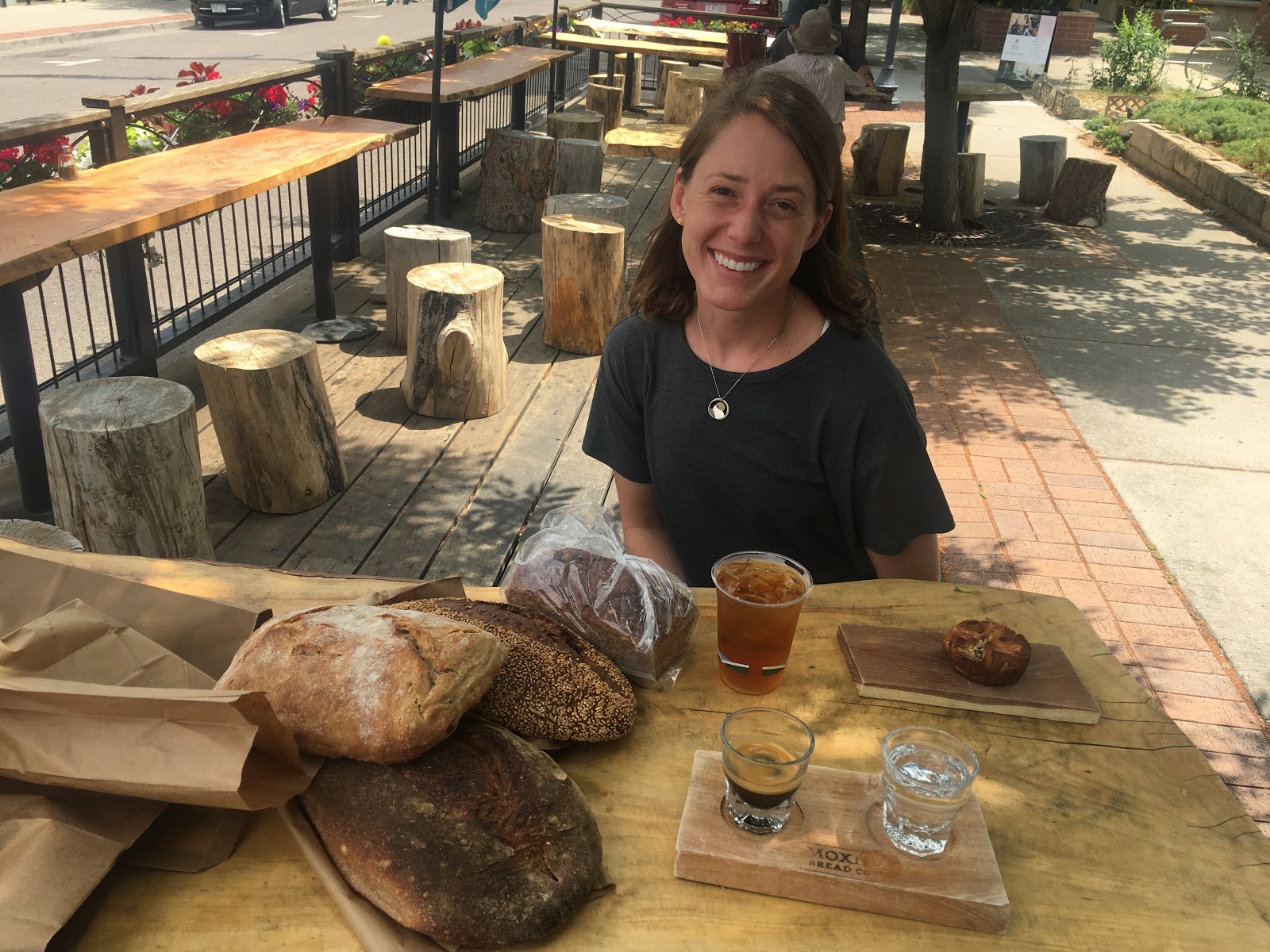
On a weekly basis, we use roughly 20,000 pounds of flour—and we’re open every week of the year. Our most important metric of quality is taste. Elements of taste and texture come first, but we prefer that they don’t come alone. Finding flour that brings more to the literal and proverbial table is a constant quest at the Bakehouse. These million pounds of flour annually provide an opportunity to address many of our goals and values at once, in a way that is far more impactful and efficient than if we addressed them each separately. In ecology, we call this “optimizing synergies.” By switching to organic all purpose flour in 2017, we decided we wanted our bread to be delicious and better for your health and better for the health of our planet. Since then, the organic bread flour we have been using is great. It is also produced by the world’s top revenue-generating food company and the largest private company in the US. This isn’t necessarily bad, but we thought our flour could align with our values even more closely. Though not a highly encouraged trait in the personal development sphere, sweating the small stuff is part of our vision and I believe that, when it comes to your craft, it can lead to awesome things. Awesome things like exploring the high desert, looking to switch from great bread flour to something even better.
More specifically, this July, Bakehouse founder Frank Carollo and I journeyed west to spend a few days in Colorado with Bay State Milling to get to know them better before we switched to using their flour. My only other trip to Colorado involved both a slightly terrifying moose encounter and throwing myself down mountains strapped into torture devices a.k.a. skis. (I’m from flat Northwest Ohio and I do best on well-glaciated land.) Luckily, the high deserts of Colorado in midsummer are much more my speed and are also pretty conducive to organic wheat farming. Unlike wet and humid Michigan, weeds are much less problematic in drier places and herbicides and fungicides are less of an agricultural necessity.
When we arrived in Loveland, we met up with Jeremy. He is from Wichita and used wonderful turns of phrase like “anything trip your trigger?” while we drove around searching for a restaurant for dinner. Jeremy is a sales rep for Bay State Milling and told us over burgers about their biggest customer, Little Caesars, the relatively small nature of their business compared to the larger mills in the country, his bowl-a-day ice cream habit, and his past role managing a facility that made pancake mixes. The distinctly mid-sized nature of Bay State Milling makes it a perfect fit because it can offer us the consistency of supply and “specs” we are used to, while providing a more intimate relationship to farmers, millers, end buyers, and the national food system in general.
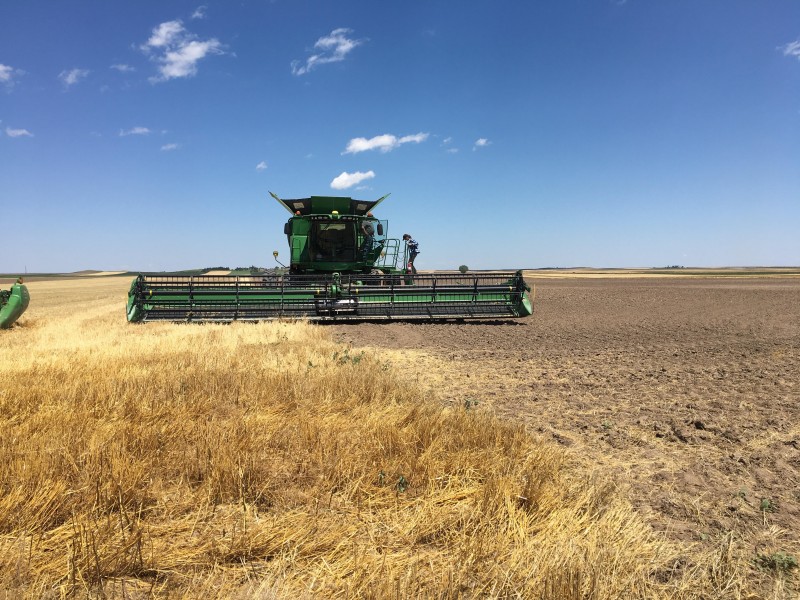
This relationship to farmers is central to my excitement about working with Bay State Milling (BSM). Most of the wheat used in our bread flour will now come from one farm. Flours are typically not single origin, they’re blended in order to hit a list of “specs,” short for specifications, that make the flour’s performance very predictable and consistent. We pay close enough attention as we bake that we can make adjustments for a range of flour attributes, but you can imagine that Little Caesars’ crust making systems, for example, have less wiggle room. Our new flour from Bay State Milling is a blend of various wheats , but it comes primarily from wheat grown on Ray Freeburg’s farm in Pine Bluffs, Wyoming. We headed there on Wednesday morning to see for ourselves, driving north a couple hours while looking for antelope and getting to know Shawn, the wheat buyer for Bay State Milling. He used to work as a grain trader and then in the beef industry. Shawn found both of these lines of work a little beyond what he wanted to stomach every day and seems to truly love serving as the link between BSM and farmers.
We arrived at Pine Bluffs to find it very aptly named. There was nothing in sight but the treed bluff in the distance and the Freeburg’s agricultural kingdom, all 60,000 acres of it. This acreage is mostly seas of grain with some islands of rangeland and a wide barn at its heart. The barn is filled and surrounded by rows of combines, tractors, pickup trucks, semis, and silos. Ray Freeburg’s family came to Wyoming as homesteaders two generations ago and literally weathered the dust bowl there. The event left its signature on the land and in the Freeburg family’s sensibilities. All along the fence lines are mounded hills from where the whipping dirt was trapped and piled high and Ray pays them tribute with his particular sensitivity to soil management, regularly adding manure from his cattle operation to his grain fields, and tilling as little as possible. These are important components of regenerative agriculture that can be ignored in typical organic systems.
Ray’s sense of history and responsibility to the land is juxtaposed with his wholehearted embracing of technologically advanced farming. It is thanks to this embrace that when I get to drive the combine, I find myself mostly operating its computer. It is nothing like driving a car, but instead what I imagine piloting a spaceship might be like. While we spent the morning harvesting wheat in our big green and yellow space combine, I asked Ray’s son about his family’s success. As family farming declines in our country, I wonder how have they managed to grow and thrive? He attributes their success to their ongoing vertical integration, willingness to embrace both technology and risk, obsessive quality standards and record keeping, and their relentless pursuit of better even when things are good. The Freeburg approach sounded incredibly similar to ours. We also talked about the type of precision agriculture that technology allows and how this eliminates waste of various kinds. This kind of precision is important when profit margins are slim, as they are in farming, and can use land and resources more efficiently and sustainably. The Freeburg’s success has also served as proof that organic farming can be profitable and has inspired a general movement towards organic farming in the area.
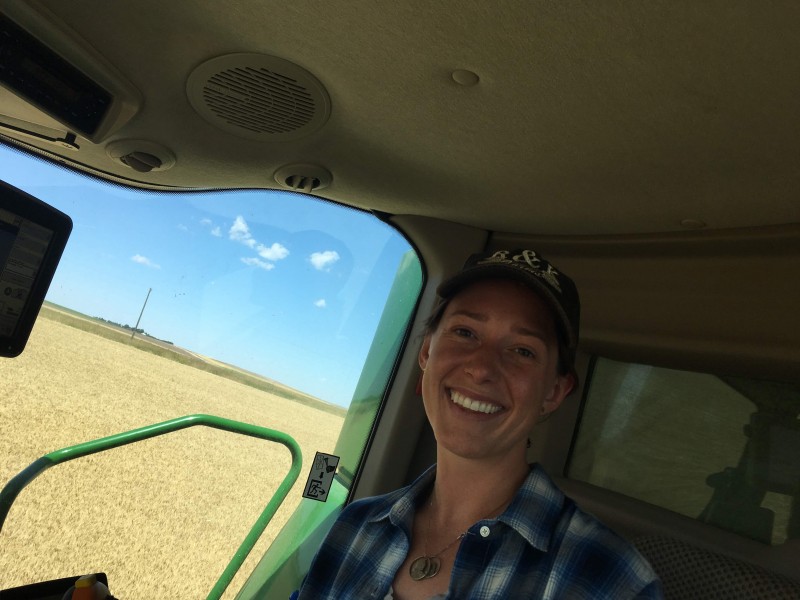
Still, the size and intensive nature of the operation also present challenges ecologically. This points to systemic issues in agriculture that are outside of the Freeburg’s control. Successful, family-owned farms are increasingly rare and in order to thrive this family has relied on economies of scale and a focus on yield that precludes more sustainable and resilient, but less economically viable, methods of farming. Diversity at the landscape level is low. Cover cropping is not a priority. The list goes on—it is the subject of whole books, many research articles, and great debate. It is complicated. What isn’t complicated is Ray’s commitment to his team and Bay State’s commitment to supporting him in turn. During our quality combine time, Ray’s son also told me that what sets them apart is their skilled and experienced team of employees and the low turn over of this group. The Freeburg’s employ about 20 people and provide them with health care, retirement funds, housing and full time, year-round employment that pays a living wage. This is pretty unprecedented in an industry that is characterized by exploiting its labor force. In turn, Ray has a low tolerance for being exploited by grain handlers. He has refused to work with larger companies because of how impersonal the buying is. He spoke to me openly and often about the trust, transparency, and support he receives from Bay State Milling. Socially and environmentally, there is a lot to applaud here.
After our combine ride-a-long and lunch in the field, Frank, Jeremy, Shawn, and I headed back south to Platteville. On the way, we passed the JBS slaughterhouse in Greely and I’m reminded of an article I read in which JBS was quoted claiming that they can’t embrace the transparency becoming more common, at the demand of consumers, in the food system because people find their business gruesome. There might not be any blood and guts involved in the wheat business, but there can still be a lot at stake, unappetizing sacrifices made, and potentially grisly externalities. This is why it matters that Bay State Milling was proud to take us to Ray’s farm that Wednesday. And this is why it matters that we are excited to tell you about it now.
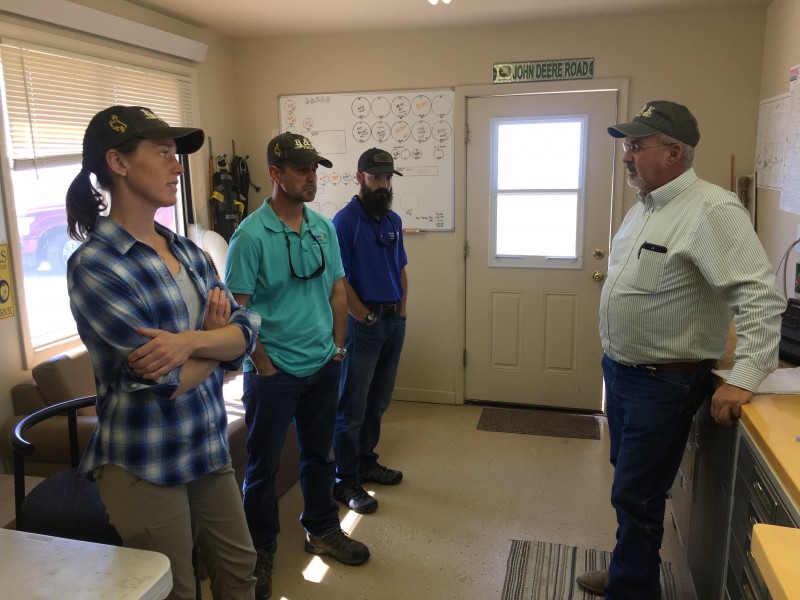
At the mill in Platteville, we don hardhats, safety goggles, and earplugs and stepped into what I can best describe as an above ground, landlocked submarine. It was hot and whirring and full of tubes. So many tubes! The miller studied milling at Kansas State and knows an incredible amount about the infrared sorting devices, the endless maze of sifting and re-sifting, and is impressively immune to being driven crazy by all the devices gyrating violently around him. Our new mill (coming soon!) will be much more like the romantic set up you were probably initially picturing. It is a relatively small stone mill that will evoke no submarine comparisons and allow us to use the freshest flour possible in many of our breads and pastries. We embrace both. Flour milled for us and flour milled by us, small farms and big farms, Michigan wheat and Colorado wheat, ancient grains and new varieties. The impending arrival of our mill and the concurrent switch to a new all-purpose flour are symbolic of our recognition that our bread making world needs them all. A coworker recently told me that his wife was reminding him that things don’t have to be black and white, either/or. Embracing the idea of “both/and” is not just good advice for our personal lives but a useful lens for understanding how a business navigates the modern food system. This modern food system changes what we do. It places constraints on how we do it. But in turn, we change that system and shape its future.
On Thursday we head back to Denver for our flight home, having gotten what we came for and more. Even in my Dramamine induced fog, I spend the flight thinking about how I’m more excited than ever about our switch to Bay State Mills’ flour. That and watching Lord of the Rings. I believe changes like these are just as much a part of our new grain vision as the other great new things we’re doing. Our freshly-milled einkorn scones, newly available at Zingerman’s businesses this month, are guaranteed to make you feel passionate about morning pastries but we are also excited to make less “sexy” changes. Like switching from delicious, organic bread flour to delicious, organic bread flour from a company that invites us to hang out with them and their farmer partners. The path narrows. Sweating the small stuff doesn’t have to look like shouting in traffic, scrubbing grout with a toothbrush, or telling your spouse that they unloaded the dishwasher “wrong”—it can be your undivided attention to rewriting the fine print, to the beauty in the details of your work. And our work starts with flour.
by Hailey Schurr, Bakehouse Source-ress
Bakehouse Sourcer-ess
